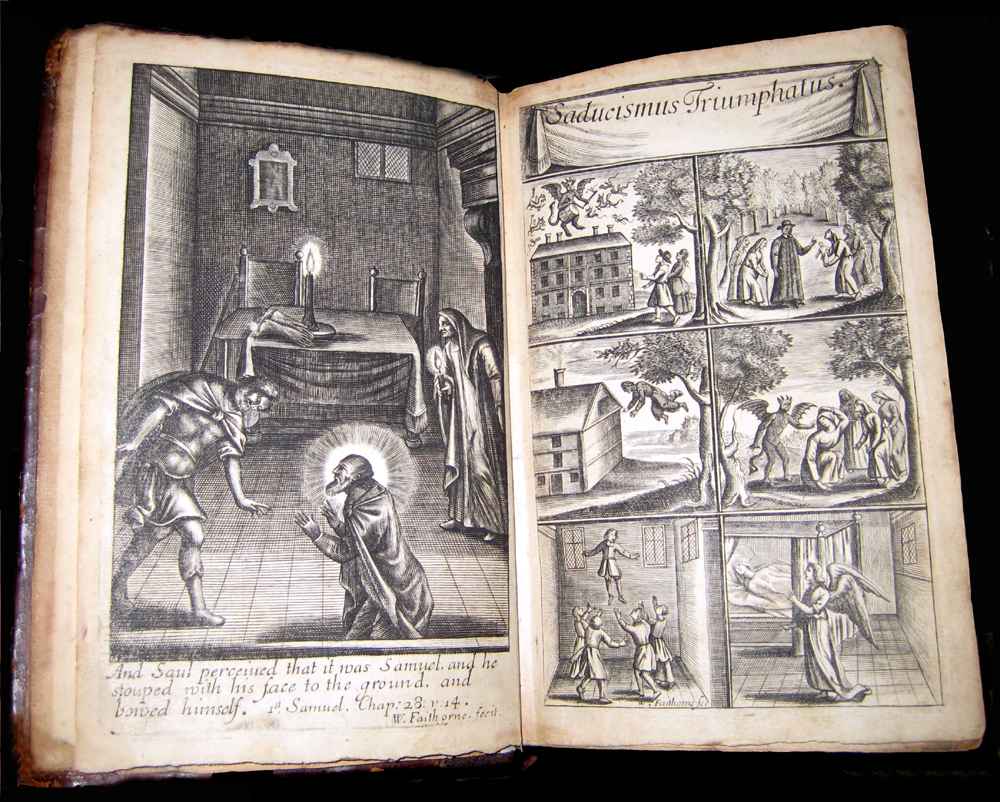The Drummer of Tedworth is a report of supernatural activity by Joseph Glanvill in the West Country of England, in his Saducismus Triumphatus. The book's Latin title Saducismus Triumphatus means The Defeat of Sadducism, and implies the denial of an afterlife. In 1668, Glanvill published one of the earlier versions of Saducismus Triumphatus, his A Blow at Modern Sadducism ... To which is added, The Relation of the Fam'd Disturbance by the Drummer, in the House of Mr. John Mompesson. The tale Glanvill told was that a local landowner, John Mompesson, owner of a house in the town of Tedworth (now called Tidworth, in Wiltshire), had brought a lawsuit against a local drummer, whom he accused of extorting money by false pretences. After he had won judgment against the drummer and confiscated his drum, he found his house plagued by nocturnal drumming noises. It was assumed that the drummer had brought these plagues of noise upon Mompesson's head by witchcraft.
The story is considered by some to be an early account of the activity of a poltergeist, a mischievous spirit that makes noises unexplainable except by supernatural causes. John Mompesson, a justice of the peace, had brought before him an ex-drummer in Cromwell’s army, who had been demanding money of the bailiff by virtue of a suspicious pass. The bailiff had believed the pass to be counterfeit, and Mompesson, who was familiar with the handwriting of the gentleman who had allegedly signed the note, immediately declared the paper to be a forgery. The drummer, whose name was Drury, begged Mompesson to check his story with Colonel Ayliff of Gretenham. The colonel would vouch for his integrity, the drummer insisted. Mompesson was swayed by the drummer’s pleas that he not be put into jail, but he told the man that he would confiscate his drum until he had checked out his story. Drury demanded that his drum be returned, but Mompesson told him to be on his way and to give thanks for his own freedom. Mompesson had the drum sent to his house for safekeeping, then left on a business trip to London.
Upon his return, his wife informed him that the household had been terrorized by strange noises in the night. She could only accredit the sounds to burglars trying to break into the house. On the third night of his return, Mompesson was brought to his feet by a loud knocking that seemed to be coming from a side door. With a pistol in one hand and another in his belt, Mompesson opened the door. No one was there, but now the knocking had begun at another door. He flung that one open, too, and finding no one there, walked around the outside of the house in search of the culprit. He found no one on his search, nor could he account for the hollow drumming that sounded on the roof when he went back to bed. From that night on, the drumming came always just after the Mompessons had gone to bed. It made no difference whether they retired early or late, the invisible drummer was ever prepared to tap them an annoying lullaby.
Read more at The Phantom Drummer of Tedworth
The story is considered by some to be an early account of the activity of a poltergeist, a mischievous spirit that makes noises unexplainable except by supernatural causes. John Mompesson, a justice of the peace, had brought before him an ex-drummer in Cromwell’s army, who had been demanding money of the bailiff by virtue of a suspicious pass. The bailiff had believed the pass to be counterfeit, and Mompesson, who was familiar with the handwriting of the gentleman who had allegedly signed the note, immediately declared the paper to be a forgery. The drummer, whose name was Drury, begged Mompesson to check his story with Colonel Ayliff of Gretenham. The colonel would vouch for his integrity, the drummer insisted. Mompesson was swayed by the drummer’s pleas that he not be put into jail, but he told the man that he would confiscate his drum until he had checked out his story. Drury demanded that his drum be returned, but Mompesson told him to be on his way and to give thanks for his own freedom. Mompesson had the drum sent to his house for safekeeping, then left on a business trip to London.
Upon his return, his wife informed him that the household had been terrorized by strange noises in the night. She could only accredit the sounds to burglars trying to break into the house. On the third night of his return, Mompesson was brought to his feet by a loud knocking that seemed to be coming from a side door. With a pistol in one hand and another in his belt, Mompesson opened the door. No one was there, but now the knocking had begun at another door. He flung that one open, too, and finding no one there, walked around the outside of the house in search of the culprit. He found no one on his search, nor could he account for the hollow drumming that sounded on the roof when he went back to bed. From that night on, the drumming came always just after the Mompessons had gone to bed. It made no difference whether they retired early or late, the invisible drummer was ever prepared to tap them an annoying lullaby.
Read more at The Phantom Drummer of Tedworth


No comments:
Post a Comment